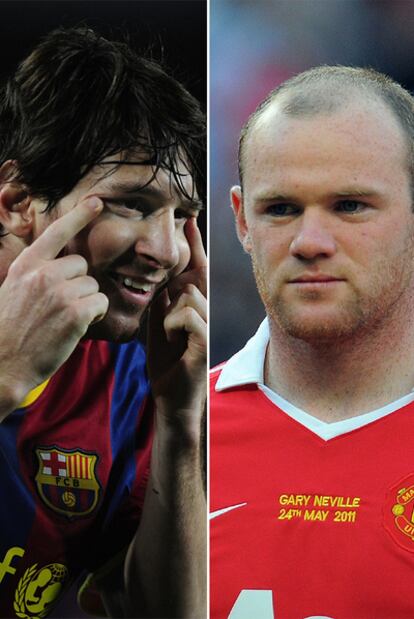London calling for Barça and United
Both first won European Cup at Wembley and continental dominance is in play
Barcelona and Manchester United meet on the Wembley turf tonight (TVE-1, from 7.15pm) in the Champions League final at a venue with added significance for both sides. The Catalan giant won its first European Cup in London in 1992, the inaugural year of the current format, while Manchester United did likewise in 1968. Sir Alex Ferguson is chasing his third Champions League triumph and Pep Guardiola his second in three years. Whichever side lifts club soccer's most-coveted trophy will do so for the fourth time in its history and join the undisputed kings of the competition, Real Madrid and AC Milan, on three Champions League successes. It will be some time yet, though, before Barça or United threaten the Spanish side's nine European Cup wins, or the Italians' seven.
Of added amusement, no doubt, to Ferguson would be the small matter of equaling Bob Paisley's three European titles with Liverpool, a club for which the Scotsman holds a thinly veiled contempt. Neither coach requires added incentive, but Guardiola will not be unaware that he will snatch the record of nemesis José Mourinho, and become the youngest coach ever to win two Champions Leagues.
The showpiece event of the continental campaign will go some way to settling a more contemporary debate; which of the two has the right to surmise itself the current big-hitter in Europe's heavyweight division. United's first Champions League, won in dramatic style in Barcelona in 1999, was achieved by an extraordinary generation of players of whom only Ryan Giggs and Paul Scholes remain at Ferguson's disposal. Barça's 1992 Dream Team, under Johan Cruyff, was anchored by Guardiola, who has his own golden generation - a term oft-applied but deservedly so in this case - of stars. Ferguson has had to reinvent his side several times since 1999 but the United ethos remains the same; there is no one player more important than the team. Barça, of course, has one Leo Messi in its ranks, a team player certainly but one with an other-worldly ability to defy the defensive machinations of an entire opposition single-handed.
United's Wayne Rooney is the fulcrum of Ferguson's attack and a career-defining match from the burly England forward could present problems for Barça's backline. But United's real strength lies in its ability to turn defense into attack with lightening speed through Ji-sung Park, Patrice Evra and Antonio Valencia. In Javier Hernández, Ferguson possesses one of the most lethal strikers in Europe in terms of minutes-to-goals ratio.
"We are not scared of Barcelona," Park said this week. "They are one of the best teams in the world, but we have our own quality."
Off the field, doubts remain over Guardiola's desire to remain at the helm of Barcelona. This season has seen the 40-year-old hospitalized with back pain, riled to the point of an expletive-ridden tirade in the bowels of the Bernabéu in response to Mourinho's season-long needling, and he himself has said that the day-to-day pressure has become a terrible burden. "Guardiola has worked terribly hard all season and it wouldn't surprise me if he left, regardless of Saturday's result," Cruyff told Gazzetta dello Sport. "If he left, it would be only because it is very difficult to withstand certain pressures in the long-term. For this reason I think he would take a year off."
To replace Ferguson perhaps? Guardiola, who speaks good English, has long been linked with a move to England and Ferguson, who has been keeping the sporting world guessing over when he will eventually call time on his 25-year tenure at United.
For many, it would be a natural progression, Ferguson handing over the reins to a philosophically like-minded manager. In the meantime, there is the issue of the installment of one or the other's current club on a continental perch to be settled.

Tu suscripción se está usando en otro dispositivo
¿Quieres añadir otro usuario a tu suscripción?
Si continúas leyendo en este dispositivo, no se podrá leer en el otro.
FlechaTu suscripción se está usando en otro dispositivo y solo puedes acceder a EL PAÍS desde un dispositivo a la vez.
Si quieres compartir tu cuenta, cambia tu suscripción a la modalidad Premium, así podrás añadir otro usuario. Cada uno accederá con su propia cuenta de email, lo que os permitirá personalizar vuestra experiencia en EL PAÍS.
¿Tienes una suscripción de empresa? Accede aquí para contratar más cuentas.
En el caso de no saber quién está usando tu cuenta, te recomendamos cambiar tu contraseña aquí.
Si decides continuar compartiendo tu cuenta, este mensaje se mostrará en tu dispositivo y en el de la otra persona que está usando tu cuenta de forma indefinida, afectando a tu experiencia de lectura. Puedes consultar aquí los términos y condiciones de la suscripción digital.








































